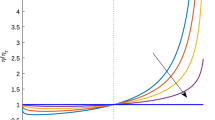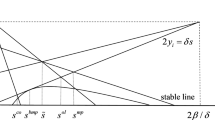Abstract
We introduce in this paper the concept of “impulse evolutionary game”. Examples of evolutionary games are usual differential games, differentiable games with history (path-dependent differential games), mutational differential games, etc. Impulse evolutionary systems and games cover in particular “hybrid systems” as well as “qualitative systems”. The conditional viability kernel of a constrained set (with a target) is the set of initial states such that for all strategies (regarded as continuous feedbacks) played by the second player, there exists a strategy of the first player such that the associated run starting from this initial state satisfies the constraints until it hits the target. This paper characterizes the concept of conditional viability kernel for “qualitative games” and of conditional valuation function for “qualitative games” maximinimizing an intertemporal criterion. The theorems obtained so far about viability/capturability issues for evolutionary systems, conditional viability for differential games and about impulse and hybrid systems are used to provide characterizations of conditional viability under impulse evolutionary games.
Similar content being viewed by others
References
Aubin, J.-P. (1991a). Viability Theory.
Aubin, J.-P. (1999b). Mutational and Morphological Analysis: Tools for Shape Regulation and Morphogenesis. Birkhäuser.
Aubin, J.-P. (1999). Impulse Differential Inclusions and Hybrid Systems: A Viability Approach. Lecture Notes, University of California at Berkeley.
Aubin, J.-P. (2000). “Optimal Impulse Control Problems and Quasi-Variational Inequalities Thirty Years Later: A Viability Approach.” In Optimal Control and Partial Differential Equations. IOS Press, pp. 311– 324.
Aubin, J.-P. (2000). “Boundary-Value Problems for Systems of First-Order Partial Differential Inclusions.” NoDEA, 7, 67– 90.
Aubin, J.-P. (2001). “Viability Kernels and Capture Basins of Sets under Differential Inclusions.” SIAM J. Control 40, 853– 881.
Aubin, J.-P. (2002). “Boundary-Value Problems for Systems of Hamilton-Jacobi-Bellman Inclusions with Constraints.” SIAM J. Control 41, 425– 456.
Aubin, J.-P., A. Bayen, N. Bonneuil, and P. Saint-Pierre (in preparation). Viability, Control and Games: Regulation of Complex Evolutionary Systems Under Uncertainty and Viability Constraints.
Aubin, J.-P. and F. Catte. (2001). “Fixed-Point and Algebraic Properties of Viability Kernels and Capture Basins of Sets.” Set-Valued Analysis 10, 379– 416.
Aubin, J.-P. and O. Dordan. (1996). “Fuzzy Systems, Viability Theory and Toll Sets.” In Hung Nguyen (ed) Handbook of Fuzzy Systems, Modeling and Control. Kluwer, pp. 461– 488.
Aubin, J.-P. and O. Dordan. (2001). “Dynamical Qualitative Analysis of Evolutionary Systems.” In Proceedings of the ECC 2001 Conference.
Aubin, J.-P. and O. Dordan. (in preparation). “Impulsive Optimal Control and Stopping Time Problems in Finite Horizon.”
Aubin, J.-P. and O. Dordan. (in preparation). “Dynamic Management of Portfolios with Impulse Transactions under Tychastic Uncertainty.”
Aubin, J.-P. and H. Frankowska. (1990). Set-Valued Analysis. Boston, Basel, Berlin: Birkhäuser.
Aubin, J.-P. and G. Haddad. (2001). “Cadenced Runs of Impulse and Hybrid Control Systems.” International Journal Robust and Nonlinear Control 11, 401– 415.
Aubin, J.-P. aand G. Haddad. (2001). “Path-Dependent Impulse and Hybrid Control Systems.” In Di Benedetto and Sangiovanni-Vincentelli (eds.), Hybrid Systems: Computation and Control, Proceedings of the HSCC 2001 Conference, LNCS 2034, Springer-Verlag, pp. 119– 132.
Aubin, J.-P. and G. Haddad. (2002). “History (Path) Dependent Optimal Control and Portfolio Valuation and Management.” J. Positivity 6, 331– 358.
Aubin, J.-P. and G. Haddad. (2002). “Impulse Capture Basins of Sets under Impulse Control Systems.” J. Mathematical Analysis and Applications 275, 676– 692.
Aubin, J.-P., J. Lygeros, M. Quincampoix, S. Sastry, and N. Seube. (2002). “Impulse Differential Inclusions: A Viability Approach to Hybrid Systems.” IEEE Transactions on Automatic Control 47, 2– 20.
Barles, G. (1985). “Deterministic Impulse Control Problems.” SIAM J. Control Optim. 23, 419– 432.
Bayen, A.M., E. Cruck, and C. Tomlin. (2002). “Guaranteed Overapproximations of Unsafe Sets for Continuous and Hybrid Systems: Solving the Hamilton-Jacobi Equation Using Viability Techniques.” In Tomlin C. and M. GREENSTREET (eds.), Hybrid Systems: Computation and Control. Springer-Verlag, LNCS 2289, pp. 90– 104.
Bayen, A.M., P. Grieder, and C. Tomlin. (2002). “A control Theoretic Prdictive Model for Sector-Based Air Traffic Flow.” In Proceedings of the AIAA Conference on Guidance, Navigation and Control, paper 2002– 5011.
Bayen, A.M., P. Grieder, and C. Tomlin. (to appear). “Lagrangian Delay Predictive Model for Sector Based air Trafic flow.” AIAAA Journal on Guidance, Controls and Dynamics.
Bayen, A.M., P. Grieder, H. Sipma, G. Meyer, and C. Tomlin. (2002). “Delay Predictive Models of the National Airspace System Using Hybrid Control Theory.” In Proceedings of the American Control Conference.
Bayen, A.M., I. Mitchell, M. Oishi and C. Tomlin. (to appear). “Lagrangian Delay Predictive Model for Sector Based Air Trafic Flow”.
Cardaliaguet, P. (1994). “Domaines Dicriminants en Jeux Diffèrentiels.” Thèse de l' Universitè de Paris-Dauphine.
Cardaliaguet, P., M. Quincampoix, and P. Saint-Pierre. (1994). “Temps Optimaux Pour Des Problèmes Avec Contraintes et sans Contrôlabilité Locale.” Comptes-Rendus de l'Acadèmie des Sciences, Série 1, Paris, 318, 607– 612.
Cruck, E. (2001). “Problèmes de Cible Sous Contraintes d'état Pour Des systèes Non Linéaires Avec sauts d'état.” Comptes-Rendus de l'Académie des Sciences, Paris.
Cruck, E. (2001). “Target Problems Under State Constraints for Nonlinear Controlled Impulsive Systems.” Journal of Mathematical Analysis and Applications 270(2), 636– 656.
Cruck, E. and P. Saint-Pierre. (to appear). “Nonlinear ImpulseTarget Problems under State Constraint: A Numerical Analysis based on Viability Theory.” Set-Valued Analysis.
Cruck, E., M. Quincampoix, and P. Saint-Pierre. (preprint). Values for Pursuit-Evasion Games with Impulsive Dynamics.
Dordan, O. (1990). “Algorithme de Simulation Qualitative d'une équation différentielle sur le simplexe.” Comptes-Rendus de l'Acadèmie des Sciences, Paris, 310, 479– 482.
Dordan, O. (1992). “Mathematival Problems Arising in Qualitative Simulation of a Differential Equation.” Artificial Intelligence 55, 61– 86.
Dordan, O. (1995). Analyse Qualitative. Masson.
Haddad, G. (1981). “Monotone Trajectories of Differential Inclusions with Memory.” Isr. J. Math. 39, 83– 100.
Haddad, G. (1981). “Monotone Viable Trajectories for Functional Differential Inclusions.” J. Diff. Eq. 42, 1– 24.
Haddad, G. (1981). “Topological Properties of the Set of Solutions for Functional Differential Differential Inclusions.” Nonlinear Anal. Theory, Meth. Appl. 5, 1349– 1366.
Lygeros, J., C. Tomlin, and S. Sastry. (1997). “Multiobjective Hybrid Controlled Synthesis.” Hybrid and Real-Time Systems, 109– 123.
Mitchell, I., A. Bayen, and C. Tomlin. (2002). “Computing Reachable Sets for Continuous Dynamic Games Using Level-Set Methods.” IEEE Transactions on Automatic Control.
Mitchell, I., A. Bayen, and C. Tomlin. (2002). “Validating a Hamilton-Jacobi Approximation to Hybrid System Reachable Sets.” In M-D. di Benedetto, and A. Sangiovani (eds.), Hybrid Systems : Computation and Control. LNCS 2289, Springer-Verlag, pp. 90– 104.
Rockafellar, R.T. and R. Wets. (1997). “Variational Analysis.” Springer-Verlag.
Saint-Pierre, P. (2003). Extension of the Viability Kernel Algorithm to Discontinuous Set-Valued Maps with Adaptative Step Discretization.
Saint-Pierre, P. (2003). “Viable Capture Basin for Studying Differential and Hybrid Games.” Applied Mathematics & Optimisation 29, 187– 209.
Saint-Pierre, P. (2001). “Approximation of Viability Kernels and Capture Basin for Hybrid Systems.” In J.L. Martins de Carvalho, (ed.), Proceedings of European Control Conference ECC. pp. 2776– 2783.
Saint-Pierre, P. (2002). “Hybrid Kernels and Capture Basins for Impulse Constrained Systems.” In C. Tomlin, M. Greenstreet (eds.), Proceedings of Hybrid Systems: Computation and Control, HSCC 2002, Lecture Notes in Computer Science, 2289, Springer.
Shi Shuzhong. (1986). “Thèorèmes de viabilitè pour les inclusions aux dèrivèes partielles.” C. R. Acad. Sc. Paris 303, Sèrie I, 11– 14.
Shi Shuzhong. (1988). “Nagumo Type Condition for Partial Differential Inclusions.” Nonlinear Analysis, T.M.A. 12, 951– 967.
Shi Shuzhong. (1989). “Viability Theorems for a Class of Differential-Operator Inclusions.” J. of Diff. Eq. 79, 232– 257.
Tomlin, C., I. Mitchell, A. Bayen, and M. Oishi. (to appear). “Computational Techniques for the Verification and Control of Hybrid Systems.” In Proceedings of the IEEE.
Tomlin, C., S. Boyd, I. Mitchell, A. Bayen, M. Johannson, and L. Xiao. (2003). “Computational Tools for the Verification of Hybrid Systems.” In Samad T. and G. Balas, (eds.), Software-Enabled Control, Wiley.
Author information
Authors and Affiliations
Corresponding author
Rights and permissions
About this article
Cite this article
Aubin, JP., Seube, N. Conditional Viability for Impulse Differential Games. Ann Oper Res 137, 269–297 (2005). https://doi.org/10.1007/s10479-005-2261-8
Issue Date:
DOI: https://doi.org/10.1007/s10479-005-2261-8




